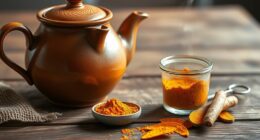I have been enjoying turmeric tea for some time now and I can confirm its various health benefits. This vibrant yellow spice has been utilized in traditional medicine for generations, with studies indicating it possesses anti-inflammatory and antioxidant characteristics that could enhance overall well-being.
If you’re like me, you might be wondering how many cups of turmeric tea you should drink per day to reap its benefits without overdoing it. In this article, we’ll explore:
- The science-backed health benefits of turmeric tea
- Recommended daily intake
- How to make it at home
- Different recipes to try out
- Precautions for certain individuals
- Potential side effects
- Why drinking turmeric tea before bed might be beneficial.
So let’s dive in!
Key Takeaways
- The recommended daily intake of turmeric tea is one cup per day, gradually increasing to two cups after a week, and not exceeding three cups per day.
- Pregnant women should limit intake to one cup per day, while breastfeeding mothers can have up to two cups per day. Those taking medication or with a medical condition should consult a doctor before consuming turmeric tea.
- Excessive intake can pose health risks such as digestive issues, and dosage limitations should be observed as excessive consumption may lead to more serious complications like liver damage.
- Turmeric can be incorporated into cooking, such as in curries, soups, and roasted vegetables, and turmeric supplements can provide concentrated amounts of curcumin, but dosage and potential interactions with medication should be considered.
Health Benefits of Turmeric Tea
Drinking turmeric tea regularly can boost your immune system, improve digestion, and reduce inflammation. The active ingredient in turmeric, curcumin, has been extensively studied for its anti-inflammatory properties. Inflammation is a natural response by the body to injury or infection, but when it becomes chronic, it can lead to numerous health problems, such as heart disease, cancer, and Alzheimer’s disease. Consuming turmeric tea on a regular basis can help reduce chronic inflammation levels in the body.
In addition to reducing inflammation, turmeric tea may also benefit your skin health. Curcumin has been shown to have antioxidant properties that protect against free radicals, which can damage skin cells, leading to premature aging. It also helps regulate sebum production, which makes it beneficial for those with acne-prone skin. Incorporating turmeric tea into your daily routine could be an easy way to support both your internal and external health without any negative side effects.
So, how much should you drink?
Recommended Daily Intake
It’s important to be mindful of how much turmeric tea we consume on a daily basis. Although this beverage has numerous health benefits, excessive intake can pose health risks.
Here are some recommended guidelines for daily intake:
- Start with one cup per day and observe any adverse reactions.
- Gradually increase the amount to two cups per day after a week or so.
- Do not exceed three cups per day as it may lead to digestive issues such as diarrhea and nausea.
- Pregnant women should limit their intake to one cup per day, while breastfeeding mothers can have up to two cups per day.
- If you’re taking medication or have a medical condition, consult your doctor before consuming turmeric tea.
By following these guidelines, you can enjoy the health benefits of turmeric tea without compromising your well-being.
In the next section, I’ll explain how to make turmeric tea at home using simple ingredients.
How to Make Turmeric Tea
You can easily make this healthy beverage at home with just a few simple ingredients and some boiling water. To make turmeric tea, you’ll need ground turmeric, black pepper, honey or maple syrup (optional), and your choice of milk or non-dairy alternative.
To begin, bring water to a boil in a saucepan and add 1-2 teaspoons of ground turmeric and a pinch of black pepper. Let it simmer for about 5 minutes, stirring occasionally. Once done, strain the mixture into your favorite mug and sweeten with honey or maple syrup if desired.
For an extra creamy texture, add warm milk or your preferred non-dairy alternative.
Now that you know how to make turmeric tea, let’s explore its benefits and different recipes in the next section!
Turmeric Tea Recipes
Get ready to spice up your life with these turmeric tea recipes that’ll add a little kick to your daily routine, giving you a taste of the exotic.
Not only is turmeric tea delicious, but it also offers numerous health benefits. Curcumin, the active ingredient in turmeric, has anti-inflammatory and antioxidant properties that can help improve digestion, boost immunity, and reduce inflammation.
There are many variations of turmeric tea recipes out there. Some popular ones include adding ginger or honey for added flavor and health benefits. You can even make iced turmeric tea by brewing it ahead of time and adding ice cubes before serving on a hot day.
Experiment with different recipes until you find the one that suits your taste buds best!
If you’re looking for other ways to incorporate turmeric into your diet, don’t worry – there are plenty of options! From curries to smoothies and even golden milk latte drinks, this versatile spice can be used in many dishes.
So why not give it a try and see how it can enhance both the flavor and nutrition of your meals?
Other Ways to Incorporate Turmeric into Your Diet
I’ve been enjoying turmeric tea for its health benefits, but there are other ways to incorporate this superfood into your diet.
One option is taking turmeric supplements, which can be found in pill or powder form.
Another way is to use turmeric in cooking, adding it to curries, soups, and roasted vegetables.
And for those who prefer a quick and easy meal or snack, try making a delicious turmeric smoothie.
These are just a few simple ideas for adding more of this powerful spice into your daily routine.
Turmeric Supplements
If you want to boost your daily turmeric intake, consider taking a turmeric supplement. These supplements are designed to provide concentrated amounts of curcumin, the active compound in turmeric. Here are some things to keep in mind when choosing and taking a turmeric supplement:
- Look for products that contain at least 95% curcuminoids.
- Consider pairing with black pepper or piperine to enhance absorption.
- Follow dosage recommendations on the label or as directed by a healthcare provider.
- Be aware of potential interactions with medications, especially blood thinners.
Taking a turmeric supplement can be an easy and convenient way to incorporate more of this beneficial spice into your routine. However, it’s important to do so safely and effectively by following guidelines and consulting with a healthcare professional if needed.
Now let’s move on to discussing how you can incorporate turmeric into your cooking.
Turmeric in Cooking
Incorporating turmeric into your meals can’t only add flavor, but can also provide numerous health benefits. For centuries, turmeric has been used in cooking, particularly in Indian cuisine. It’s commonly used to add color and flavor to rice dishes, curries, soups, stews, and even smoothies.
There are plenty of culinary uses of turmeric beyond the traditional dishes. For example, you can sprinkle it on roasted vegetables or use it as a seasoning for scrambled eggs or tofu. Making a simple turmeric tea is easy too – just steep fresh grated or powdered turmeric in hot water with lemon juice and honey. Adding black pepper to your turmeric recipes may enhance its bioavailability due to the presence of piperine.
If you prefer something cold and refreshing, consider trying a turmeric smoothie for breakfast or as an afternoon snack. Smoothies are easy to make and versatile enough that you can customize them with your favorite fruits and veggies. In the next section, I’ll share some tips on how to incorporate this spice into your smoothie recipes for maximum health benefits.
Turmeric Smoothies
You can easily boost your health and enjoy a delicious treat by adding turmeric to your daily smoothies. Here are some turmeric smoothie recipes that you can try:
- Mango Turmeric Smoothie: Blend together mango, banana, coconut milk, turmeric powder, and black pepper for a refreshing and anti-inflammatory drink.
- Golden Milk Smoothie: Combine almond milk, frozen banana, dates, turmeric powder, ginger root, cinnamon powder, and vanilla extract for a creamy and warming beverage.
- Green Goddess Smoothie: Mix spinach leaves, cucumber slices, pineapple chunks, coconut water or juice, turmeric powder or fresh turmeric root (peeled), and honey or agave nectar for an energizing and detoxifying concoction.
- Chocolate Turmeric Smoothie: Whisk together cocoa powder or cacao nibs, almond butter or peanut butter (unsweetened), coconut milk or yogurt (unsweetened), banana or avocado (ripe), maple syrup or stevia extract (optional), and turmeric paste (made from boiling grated fresh turmeric in water) for a decadent yet healthy treat.
Besides being tasty and colorful additions to your diet plan, these smoothies offer various benefits of turmeric in skincare. The curcumin compound found in turmeric has antioxidant properties that help protect the skin from damage caused by free radicals. It also helps reduce inflammation that may contribute to acne breakouts or eczema flare-ups. Moreover, drinking enough fluid-rich drinks like smoothies can hydrate the skin from within and promote its elasticity.
To ensure safe consumption of this spice-enriched beverage option for all individuals who intend to add it to their diet routine as part of their wellness goals, step with caution.
Precautions for Certain Individuals
As a pregnant and breastfeeding woman, I always make sure to be cautious about what I consume. Especially when it comes to herbs and supplements like turmeric. It’s important to note that consuming high amounts of turmeric may increase the risk of miscarriage or preterm labor. So it’s best to consult with a healthcare professional before incorporating it into your diet.
Additionally, those with gallbladder issues or who are taking blood-thinning medications should also exercise caution when consuming turmeric. It may exacerbate their conditions or interact with their medication.
Pregnant and Breastfeeding Women
If you’re expecting or nursing, it’s crucial to limit your intake of turmeric tea to a maximum of one cup per day, like a drop of water in a vast ocean. While turmeric has numerous health benefits, it can also cause potential harm to both the mother and baby if consumed excessively during pregnancy or while breastfeeding.
Here are some precautions that pregnant women and new mothers should take into consideration:
- Turmeric can stimulate uterine contractions which may increase the risk of premature labor.
- Curcumin, the active ingredient in turmeric, can pass through breast milk and potentially cause jaundice in newborns.
- High doses of turmeric may lead to gastrointestinal issues such as nausea and diarrhea.
- Turmeric supplements are not recommended for pregnant women as they may contain other herbs that could be harmful.
It’s important for pregnant women and new mothers to consult with their healthcare provider before incorporating any new food or drink into their diet. They should also monitor their body’s response when consuming small amounts of turmeric tea and stop immediately if they experience any adverse effects.
Moving on to people with gallbladder issues, excessive consumption of turmeric tea may worsen symptoms such as abdominal pain and bloating.
People with Gallbladder Issues
For those experiencing gallbladder issues, excessive consumption of turmeric may exacerbate symptoms such as abdominal discomfort and bloating. It is important to be mindful of the amount of turmeric consumed in a day, especially for individuals with a history of gallbladder problems. Incorporating turmeric into meals in moderation can still provide its health benefits without causing any negative effects.
When it comes to a gallbladder diet, it is recommended to limit intake of high-fat foods and increase consumption of fruits, vegetables, lean proteins, and whole grains. In terms of turmeric dosage, it is best to consult with a healthcare provider before adding it into one’s diet. They can provide guidance on safe amounts to consume based on individual health needs and medical history. Moving forward, let’s explore how people on blood-thinning medications can incorporate turmeric into their diet safely.
People on Blood-Thinning Medications
If you’re taking blood-thinning medications, incorporating turmeric into your meals in moderation can still provide its health benefits without interfering with your medication. Turmeric contains curcumin, a compound that has anti-inflammatory properties and is known to improve brain function, lower the risk of heart disease, and even prevent cancer. However, it’s important to take precautions when consuming turmeric as a supplement or in high doses since it can increase the risk of bleeding.
To ensure safe consumption of turmeric while on blood-thinning medications, here are some dosage recommendations and precautions to keep in mind:
- Consult with your healthcare provider before adding turmeric supplements or high doses of turmeric into your diet.
- Stick to using only small amounts of turmeric as a spice (about 1/4 teaspoon per day).
- Avoid taking concentrated turmeric extracts or supplements without medical supervision.
- Be aware that some herbal teas may contain high levels of turmeric and should be consumed with caution.
Incorporating these guidelines will allow you to benefit from the health-boosting properties of turmeric while minimizing any potential risks associated with blood thinning medications. It’s important to note that although natural remedies like turmeric have many health benefits, they may not always be suitable for everyone and should be approached with caution.
Moving on, while moderate consumption of turmeric tea is generally safe for most people, excessive use can lead to unwanted side effects such as diarrhea or stomach upset.
Potential Side Effects of Turmeric Tea
Turmeric tea can cause gastrointestinal issues such as nausea, diarrhea, and stomach cramps. These potential risks should be taken into consideration when exploring turmeric tea side effects. Dosage limitations should also be observed as excessive consumption may lead to more serious complications like liver damage.
To help you better understand the possible side effects of turmeric tea, here’s a table detailing some of the precautions that need to be taken:
| Side Effect | Precaution | Management |
|---|---|---|
| Nausea | Start with small doses and gradually increase intake. Avoid taking on an empty stomach. | Drink water or ginger tea; stop drinking turmeric tea if symptoms persist |
| Diarrhea | Limit intake to one cup per day. Avoid drinking before meals. | Stay hydrated; eat bland foods like rice and boiled potatoes |
| Stomach cramps | Take breaks from drinking turmeric tea. | Rest; drink chamomile or peppermint tea |
It’s important to note that while there are potential side effects of drinking turmeric tea, these can be managed by taking necessary precautions. In fact, drinking this beverage has been linked to several benefits which we will explore in the next section about the benefits of drinking turmeric tea before bed.
Benefits of Drinking Turmeric Tea Before Bed
You might be surprised to learn about the benefits of drinking turmeric tea before bed. Studies have shown that turmeric contains compounds that can help improve sleep quality and reduce inflammation in the body. Drinking this tea at night may also help you relax and wind down after a long day.
But, did you know that turmeric tea can also provide benefits when consumed in the morning? It’s been found to aid digestion, boost metabolism, and even promote weight loss. If weight loss is your goal, then it’s best to drink turmeric tea before meals as it can help regulate blood sugar levels and reduce cravings throughout the day.
Overall, incorporating turmeric tea into your daily routine can provide numerous health benefits for both mind and body.
Frequently Asked Questions
Can turmeric tea be consumed with milk or other additives?
Yes, turmeric tea can be consumed with milk or honey. Adding milk may increase the absorption of curcumin in turmeric, while honey adds natural sweetness. However, moderation is key to avoid potential side effects.
Can turmeric tea be consumed by pregnant or breastfeeding women?
As a healthcare professional, I recommend pregnant or breastfeeding women to consult their doctor before consuming turmeric tea. While it has many benefits, precautions for pregnancy and nursing should be taken into consideration. Dosage and frequency for expecting and lactating mothers should also be discussed with a healthcare provider.
Can turmeric tea help with weight loss?
I was surprised to learn that turmeric tea benefits weight loss! Its anti-inflammatory properties help regulate metabolism and reduce inflammation-related weight gain. Try a recipe with black pepper for better absorption.
Is it necessary to boil turmeric tea for a certain amount of time for maximum benefits?
Boiling turmeric tea for 10-15 minutes helps release its beneficial compounds, but taste preferences may vary. It’s not necessary to boil it for maximum benefits, but doing so can enhance its potency.
Can turmeric tea be consumed in the morning on an empty stomach?
Oh, the joys of wellness trends. But fear not! As for the best time to drink turmeric tea, consuming it in the morning on an empty stomach can maximize its benefits. Turmeric tea has been shown to aid with digestion and reduce inflammation.
Conclusion
Overall, turmeric tea is a delicious and healthy addition to anyone’s daily routine. It’s no wonder why this superfood has gained so much popularity in recent years, given its numerous health benefits, such as reducing inflammation and improving brain function.
According to a study published in the Journal of Medicinal Food, consuming just one cup of turmeric tea per day can significantly improve overall health and well-being. This statistic should serve as an incentive for those who may be hesitant to incorporate turmeric into their diet.
So why not give it a try and see how this powerful spice can transform your health? Whether you enjoy it hot or iced, plain or with added flavors like ginger and honey, turmeric tea is an easy way to reap the benefits of this amazing superfood.










